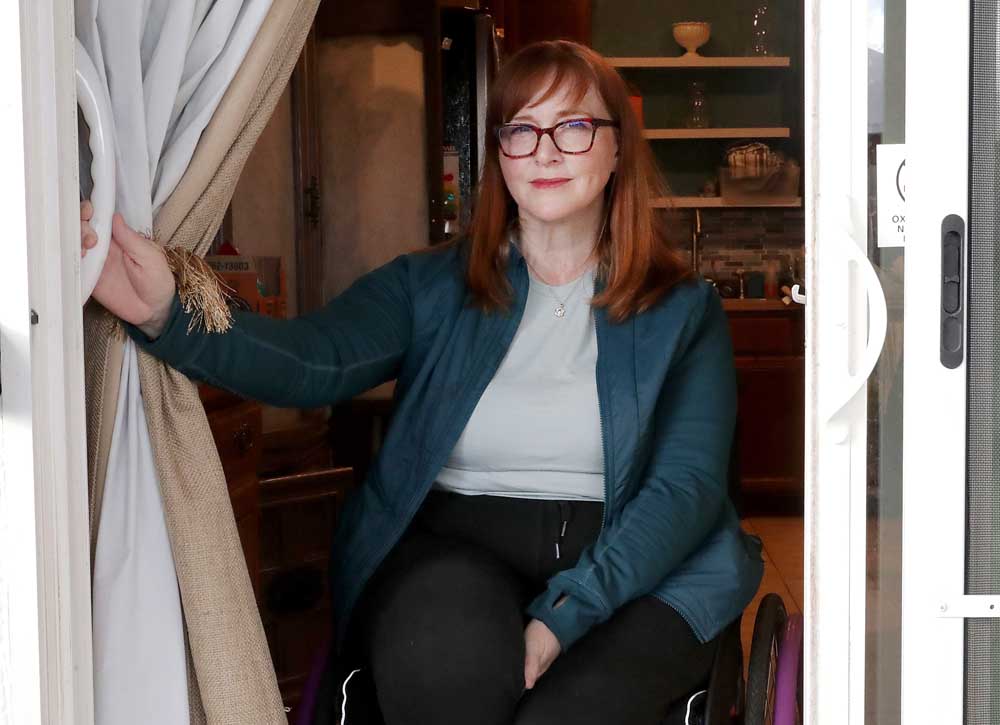‘A miracle as it is’: Injured SOU professor reflects on 2022 auto-pedestrian crash
Published 12:00 pm Sunday, January 21, 2024

- Southern Oregon University Assistant Professor Rebecca Williams at her home in White City on Dec. 29, 2023.
Rebecca Williams, an assistant professor in Southern Oregon University’s school of business, isn’t ready to spend another summer at the beach.
She used to make the Beachfront RV Park in Brookings, two-and-a-half hours southwest of her home in White City, her place to kayak, paint rocks and barbecue.
That changed on July 4, 2022, when Williams and her friend, Hiedei Bailey, of White City, were struck by a speeding van. Bailey, 38, died from her injuries. A California woman was also injured in the auto-pedestrian crash.
The 66-year-old man driving the van was never criminally charged, even though he allegedly ingested marijuana and failed to medicate his diabetes just before the crash. Williams filed a $3 million civil lawsuit against the man but dropped it in October, just before trial, because her attorneys believed they could not get any more money from him even if Williams won.
During an interview late last month from her home, which is outfitted with a ramp to help her get around in her wheelchair, Williams said she wakes up every morning in pain, making it hard not to think about the 2022 crash “all the time.”
“My whole life is just gone,” Williams said. “I’m still angry.”
‘I was alive’
When the crash occurred, the van dragged the assistant professor and ran over her twice, Williams said in an interview. She suffered numerous injuries, including a broken pelvis, a collapsed lung, at least 16 broken ribs, multiple breaks to her humerus, organ damage, paralysis below her elbow and injuries to her left knee, according to her civil complaint.
Williams underwent emergency surgery in a hospital in Crescent City, California. She was there less than 24 hours before she was taken to a trauma center in Redding, California, where she awoke from her coma some two weeks after the crash.
“That was amazing itself — that I was alive, that I survived all of the injuries,” Williams said. “It was pretty bad.”
She added, with a laugh, “I looked pretty bad, too,” referring to her bruises and stitches.
Williams’ emergency care wasn’t the end of her traumatic medical journey. She also developed infections in the hospital and suffered injuries to the muscles, nerves and soft tissues of her arms, abdomen, pelvis and legs, according to her civil complaint.
Williams received trauma care in Redding for seven to eight weeks, she said, before being moved to a facility in nearby Anderson, where she spent even more time in rehabilitation.
“Learning to shower, eat again, write again, speak again — it’s like being a baby,” Williams said.
Of all the care she received, Williams cited a Redding doctor, Aaron Osborne — whom she dubbed “an Ortho-God” — for the work he did in putting her pelvis back together. Osborne later told Williams her case was the hardest he’d ever had, according to Williams.
“That’s all he could do to bind it together and screw everything together,” Williams said. “I have lots of metal in my body now.”
‘Always willing
Doctors wanted to keep Williams in Redding after she’d spent months there, but she chose to return to the Rogue Valley.
“I am kind of stubborn, so I came home and did home health,” she said.
Providence Home Health provided physical, occupational and speech therapy to Williams multiple times a week from October 2022 to October 2023.
In an interview last Monday, Carien Jordaan, an occupational therapist who acted as a supervisor in Williams’ case, talked about the range of challenges the assistant professor faced as she began home care health. Such care, Jordaan said, can feel overwhelming for any patient.
“She was mourning the loss of all of her physical losses. She was in extreme pain. She mourned the loss of a dear friend. She mourned the loss of being a functional mom, and she mourned the loss of not working. There was just so much,” Jordaan said. “And then, if you think of ‘I’m having a bad day,’ ‘I’m feeling a lot of pain,’ ‘I’m feeling depressed,’ no one feels like opening the door to any stranger.”
Williams was “always willing” to do what was required from Providence Home Health, Jordaan said. “But that doesn’t mean the therapy session was easy to do.”
Williams’ physical therapy included work on balance and strengthening her lower body so she could learn to walk again.
“She was basically wheelchair-bound when we met her,” Jordaan said. “At some point, your wheelchair becomes very comfortable and a safety zone. You really have to work on trusting yourself in standing again.”
Williams worked on her standing endurance by simulating certain tasks in her kitchen.
Williams’ occupational therapy focused on re-learning how to do basic things like taking a shower, getting dressed, cooking and laundry. She also learned stress and pain management, as well as energy conservation strategies.
“What I love about occupational therapy is, you look at the whole person and it allows you to find activities that that person likes to do and you use that to help them to heal,” Jordaan said.
Williams loves to paint, so she worked on different pieces alongside an artistically talented occupational therapist assistant to learn how to manage stress. Painting also taught Williams how to manage pain and improved her ability to focus.
“Painting … wasn’t used to help her hand function; it was more used to help with the other things,” Jordaan said.
Williams’ home health team departed in the fall. Now she attends other therapy sessions, just not from home.
“I just think she’s a remarkable woman,” Jordaan said. “Even though she has had many dark days — and I think she still will have some very hard days ahead of her — she always wants to bounce back. She’s always looking for ways to improve herself.”
‘Back to some normalcy’
Williams worked for the university from home during the fall 2023 term by launching classes, grading papers and advising students.
“It’s been very difficult,” she said.
Even after she returned to work, Williams learned the crash affected her in other ways. Her vision can sometimes go blurry, and she can’t read text even with her glasses.
“It has made the grading aspect very hard,” Williams said. Another professor helped her complete her grading for the previous term, she said.
Williams plans to work from home and rest her voice for the remainder of the academic year so she can return to campus fall term 2024.
Williams celebrated the holidays with her family at the Rogue Valley Mall, where she enjoyed the “Baffled Escape Room” a few days before Christmas. The rooms give groups of people one hour to find their way out by “finding clues and solving puzzles,” according to the business’ website.
“Getting back to some normalcy often helps, absolutely,” Williams said.
Her goal for 2024 is to walk without assistance again.
“It would be a miracle,” Williams said, “but I am a miracle as it is right now.”






